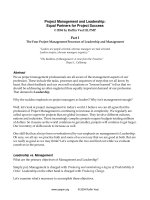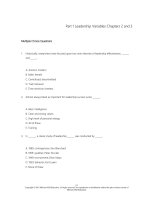Lecture Art of Leadership and Motivation - Lecture 9
Bạn đang xem bản rút gọn của tài liệu. Xem và tải ngay bản đầy đủ của tài liệu tại đây (1.09 MB, 49 trang )
Art of Leadership & Motivation
HRM – 760
Lecture - 9
FACILITATOR
Prof. Dr. Mohammad Majid Mahmood
Leader
Leader as
as aa
Change
Change Agent
Agent
2
We
We Want
Want Change
Change Without
Without Change
Change
3
Why
Why Change?
Change?
INSANITY
Doing the Same Things
&
Expecting
Better Results
4
Why
Why Change?
Change?
CHANGE IS THE ONLY
THING THAT WILL
NEVER CHANGE. SO
BETTER ADAPT TO IT.
5
What ever level you reach,
getting better never stops
6
Any alterations in the
people, structure, or
technology of an
organization.
7
change must involve the
people – change must
not be imposed upon
the people
8
Change
Difference between two situations or conditions
Change is a window or way where you can see the
future or outcome or a different world.
9
Change
Change
“If You Can’t Change
Your Mind, You
Can’t Change
Anything”-George B. Shaw
10
WHY PEOPLE DON’T
CHANGE ?
Comfort Zone
Changes may lead to anger, hatred,
jealousy and violence
11
Reacting
Reacting to
to Change
Change
Deny/ignore it
Fight it
Suffer through it
Run from it
Embrace it
12
PSYCHOLOGY OF CHANGE
We experience changes physically, mentally and emotionally
Usually it is slight and slow but it can be sudden – disrupting our work,
dislocating our relationships or ruining our leisure time.
Sometimes we can explain it, sometimes not
Changes involves the familiar; sometimes the unknown. Many of us prefer
what is familiar.
Rather than seek change, we continue to live with our old familiar feelings
(patterns and routines)
13
Why is Change Management Important?
The
The biggest
biggestreason
reason why
why
organizational
organizationalchange
change
fails
fails
Not
Notplanning
planningto
to manage
manage
its
its impact
impacton
on people
people
People want to be successful
People feel successful once they have mastered their
environment and believe it is secure
People will resist any change to the work environment that
impacts their security
14
Change
Change is
is aa Process
Process
Where you want to be
Where you are today
15
Determining
What
Should be
Changed?
16
A Generic Typology of
A Generic Typology of
Organizational Change
Organizational Change
Adaptive
Change
Reintroducing a
familiar practice
Innovative
Change
Introducing a
practice new to
the
organization
Low
Radically
Innovative
Change
Introducing a
practice new to
the industry
High
Resistance to Change
17
Reasons
Reasons for
for Change
Change
1. Current needs have been met
2. New needs have been identified
3. The environment changes
-Robert Byrne-
18
Workforce
World
Politics
Social
Trends
Technology
Forces For
Change
Economic
Shocks
Competition
19
Agents
Agents of
of Change
Change
Inside
Change Agents
New
inductions
Outside
Change Agents
20
What
What Should
Should II Do?
Do?
Obviously, you won’t be able
to control everything that
happens to you. But you’re
in complete control of how
you respond to what
happens.
21
Human beings,
by changing the inner
attitudes of their minds, can
change the outer aspects of
their lives.
William James (1842 - 1910)
22
ANTICIPATE
CHANGE EVEN
WHEN THINGS
ARE GOING
RIGHT
23
ALWAYS LOOK AT
THE
OPPORTUNITIES
THAT CHANGE
REPRESENTS
24
DO NOT ALLOW
ROUTINES TO
BECOME
CHAINS
25









